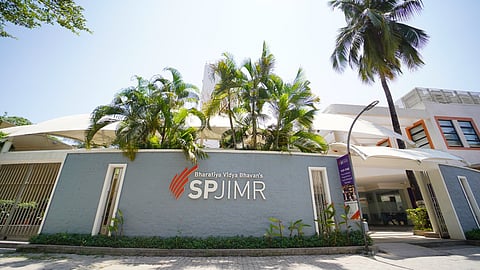Through innovations, SPJIMR makes a societal impact
In the vibrant landscape of Indian management education, where tradition often meets innovation, Varun Nagaraj stands out as a unique figure. Appointed as the Dean of S.P. Jain Institute of Management & Research (SPJIMR), Nagaraj’s journey to academia is anything but conventional. Having spent over three decades in the bustling corridors of Silicon Valley and Boston, he brings a wealth of industry experience to his role, marking a significant pivot from corporate leadership to academic stewardship.
“After spending over three decades in corporate leadership in the US, I realised the potential for greater societal impact through education, rather than just product innovation,” says Nagaraj, reflecting on his extensive career, including as CEO of several Silicon Valley companies. His rich product innovation background gave him insights into the intersection of business and societal needs. His arrival at SPJIMR came during the tumultuous period of the Covid-19 pandemic.
With a commitment to academic excellence, he sought to create an environment focussed on critical thinking and societal responsibility. “This institution has a distinctive focus on taking intelligent risks, promoting creative problem-solving and fostering an action-oriented approach to challenges,” he says.
By embracing such a philosophy, Nagaraj redefined the meaning of a business school in India. He believes that the traditional academic approach must evolve to address real-world problems and prepare students for the complexities of the modern business landscape.
Redefining education
Under Nagaraj’s leadership, SPJIMR has embraced a philosophy that prioritises action-oriented learning. He believes that traditional educational paradigms must evolve to address the complexities of the modern business world. This shift reflects his commitment to preparing students for careers in business and as responsible global citizens.
One of the most significant advancements initiated under Nagaraj’s stewardship is introducing the concept of ‘wise innovation’. This framework blends innovative thinking with ethical considerations, urging students to develop solutions that are not only effective but also socially responsible. Wise Innovation is about understanding the broader implications of business decisions and striving to create value that extends beyond profit margins.
“Our goal is to ensure that every student understands what innovation is and how it can align with ethical and societal imperatives,” he elaborates. This curriculum component is mandatory for all MBA students. It sets the stage for students to comprehend the critical role of innovation in today’s society.
“We must question our motivations: are we innovating for the right reasons, with consideration of all stakeholders involved?” asks Nagaraj, who feels this perspective promotes a more holistic view of innovation. It also ensures that students think about profitability and the broader social implications of their innovations.
Additionally, SPJIMR’s Wise Innovation Studio for Emerging Technologies (WISE Tech) brings together a diverse group of innovators united by this vision – entrepreneurs, students, alumni, corporate leaders, investors and academics – with the goal to foster responsible, sustainable and ethical innovation by providing a platform for collaboration and knowledge sharing. “WISE Tech is not just an innovation hub; it is a community dedicated to harnessing emerging technologies for greater corporate and societal impact,” he explains.
The Abhyudaya programme
SPJIMR stands out not just for its innovative curriculum but also for its commitment to community engagement through initiatives like the Abhyudaya programme. This initiative aims to mentor underprivileged school students called sitaras (stars) from Mumbai’s K West ward, allowing them to access quality education and exposure to various fields. “We believe that producing socially aware graduates is paramount,” Nagaraj remarks. “Each year, we prepare our students to think critically about their societal impact.”
The Abhyudaya initiative embodies SPJIMR’s mission to create an army of socially responsible graduates who are equipped to tackle society’s challenges. It encompasses a deep commitment to mentoring, with MBA students actively engaging with younger students through workshops, seminars and various educational activities. This initiative will enhance the educational opportunities for underprivileged students and instil a sense of social responsibility in SPJIMR students. “By working closely with the sitaras, we aim to create a sustainable mentorship programme that empowers both mentors and mentees,” adds Nagaraj.
The Abhyudaya programme allows SPJIMR students to apply their learning in real-world contexts, enhancing their understanding of societal issues, while developing soft skills crucial for their future careers. “This practical experience helps them become good managers and compassionate citizens,” Nagaraj points out.
SPJIMR had pioneered the Development of Corporate Citizenship (DoCC) initiative more than 30 years ago to enhance its commitment to societal impact further. This programme provides MBA students with internships in rural areas, allowing them to engage with local communities and immerse themselves in real-world challenges these populations face. Every year, all 360 students in the two-year programme undertake a 4-5 weeks internship with an NGO, giving them invaluable insights into social issues. It promotes hands-on experience and exposes students to the day-to-day realities of rural life in India. It also encourages them to think critically about how business practices can be adapted to create value in underserved communities.
In addition to curricular changes, Nagaraj is keen to foster collaborations between SPJIMR and various sectors, including government, non-profits, and the corporate world. He recognises that addressing societal challenges requires a collective effort, and he is dedicated to building partnerships that amplify the impact of educational initiatives. By engaging with external stakeholders, SPJIMR aims to create a rich ecosystem where students can learn from real-world experiences and contribute to meaningful projects.
As technology continues to reshape the business landscape, Nagaraj acknowledges its critical role in education. He is committed to leveraging digital tools and platforms to enhance the learning experience at SPJIMR. By incorporating online learning modules, virtual simulations, and data analytics into the curriculum, he aims to prepare students for a tech-driven future.
“Technology is not just a tool; it’s a catalyst for change,” he sums up, highlighting the importance of equipping students.

